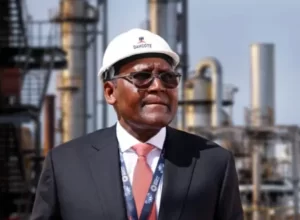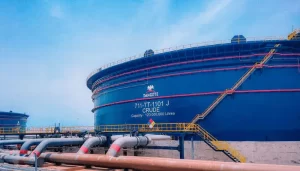
In a significant development affecting Nigeria’s downstream petroleum sector, the retail price of Premium Motor Spirit (PMS), commonly known as petrol, has escalated to between N1,050 and N1,150 per liter, contingent upon location. This surge is a direct consequence of the Dangote Petroleum Refinery’s recent adjustment of its ex-depot price from N899 to N955 per liter, coupled with similar increases by various depot owners.
Dangote Refinery’s Price Adjustment
On January 17, 2025, the Dangote Petroleum Refinery, a $20 billion facility, announced a revision in its PMS pricing structure. According to an official communication to its customers, marketers procuring between two million and 4.99 million liters are now charged N955 per liter, while those purchasing five million liters or more are billed at N950 per liter. This adjustment represents a 6.17% increase from the previous rate of N899.50 per liter, which was offered as a holiday discount in December 2024.
Ripple Effects Across the Supply Chain

The refinery’s price hike has triggered a cascading effect throughout the fuel supply chain. Private depots, even those with existing stock, have adjusted their loading prices accordingly. For instance:
- Sahara Depot increased its price to N970 per liter from N950.
- Pinnacle Depot raised its rate to N970 from N921.
- NIPCO adjusted its price to N980 from N950.
- Rainoil set its new price at N970, up from N950.
- Alkanes Depot in Calabar now charges N1,000 per liter.
These adjustments have inevitably led to higher retail prices at filling stations nationwide.
Industry Stakeholders’ Perspectives
The Independent Petroleum Marketers Association of Nigeria (IPMAN) has projected a steep increase in retail petrol prices, anticipating that consumers in Lagos and neighboring states may pay up to N1,100 per liter, while those in the Federal Capital Territory could face prices as high as N1,150 per liter.
Chinedu Ukadike, IPMAN’s National Publicity Secretary, attributed the price surge to the rising cost of Brent crude oil, stating, “Yes, Dangote has increased its price to N955. This is only because of the increase in Brent crude. Once it increases, the domestic production cost will also increase.”
Similarly, the Petroleum Products Retail Outlet Owners Association of Nigeria (PETROAN) has indicated that retailers may need to adjust their margins beyond the current N45 per liter to accommodate the increased costs. Billy Gillis-Harry, PETROAN’s National President, noted that while some members continue to sell at N935 per liter under existing agreements, prices are likely to exceed N1,000 per liter once these agreements are renegotiated.
Economic Implications
The upward trajectory of petrol prices is poised to have far-reaching economic implications. Higher fuel costs are expected to exert inflationary pressures, affecting the cost of goods and services across the country. The situation underscores the delicate balance between market-driven pricing and the socio-economic realities faced by the Nigerian populace.
Conclusion
As the dynamics of global crude oil prices continue to influence domestic fuel costs, stakeholders and consumers alike are bracing for the economic ripple effects. The recent adjustments by the Dangote Refinery and subsequent reactions within the supply chain highlight the complexities inherent in Nigeria’s journey toward a fully deregulated petroleum market.

